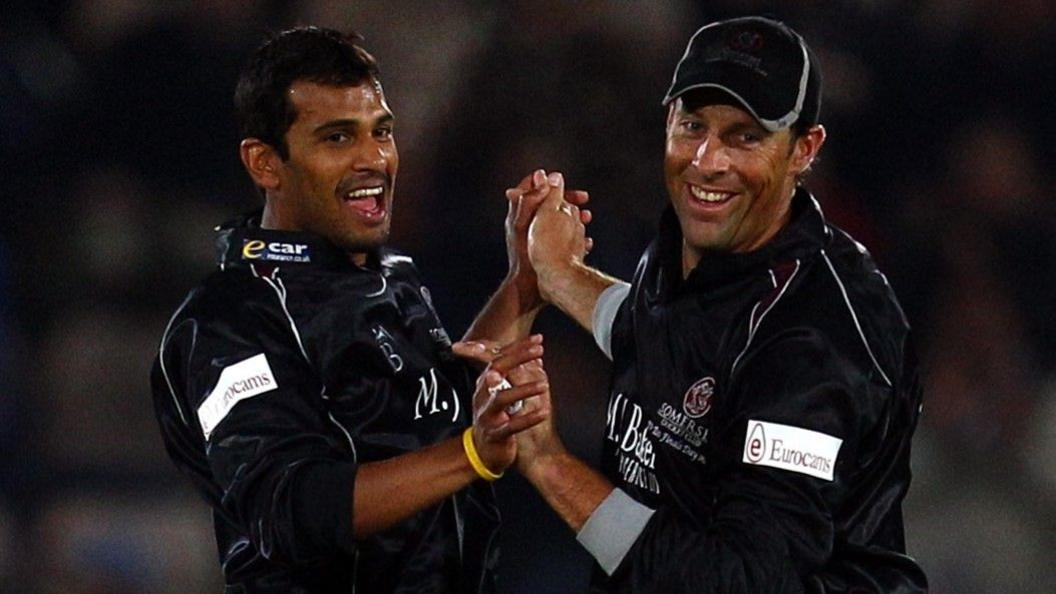'I was on my last chance' - cricketer's anorexia battle

Arul Suppiah, left, once held the record for the best T20 bowling figures when he took 6-5 for Somerset against Glamorgan in 2011
- Published
Former Somerset all-rounder Arul Suppiah was teaching accounting and business studies in his new role at Queens College Taunton when he noticed something was wrong.
As he stood up to start the next lesson of a double period, he felt faint and only the wall he fell against was keeping him upright.
He'd lost 15kg in weight, was tired and irritable and all he could think about was feeding what he called 'The Voice', the internal thoughts which "possessed" him and controlled everything he ate. 'The Voice' was anorexia nervosa.
'I was on my last warning' - what is anorexia?
Classed as an eating disorder and serious mental health condition by the NHS, anorexia is often associated with young women - not former professional sportsmen in their 30s.
Except it should be. Anorexia can affect anyone at any time and for Suppiah, who made more than 200 appearances in county cricket, it had taken over his life.
What started as a health kick in 2017 had turned into something much more serious. Suppiah was exercising too much, eating too little and actively avoiding social situations, particularly those involving food.
The weight dropped off Suppiah and the comments on his appearance from those around him served as validation to 'The Voice'.
After he almost fainted at work, a subsequent doctor's appointment where he was advised to take time off and some soul-searching with his family, he decided enough was enough. Except it wasn't.
"It got worse after being signed off," said Suppiah, 41. "I was literally on my last warning.
"I remember my psychiatrist saying, 'if you don't improve or if you don't progress, I'll have to send you to hospital under the Mental Health Act,', external to sort of be sectioned.
"I pleaded with her to give me a chance and I somehow managed to just turn it around a little bit."
Suppiah's road to recovery
That "little bit" of progress was the start of a long journey.
Suppiah, with help from the Professional Cricketers' Association (PCA), a team of experts and his girlfriend and her family, realised something had to change.
"You do know that you have to eat and you have to get better, otherwise your organs will fail you," said Suppiah, who was born in Malaysia and came to England to further his cricket and attend Millfield School.
Slow and steady was the key. He would eat eight small meals a day with the aim of returning to a healthy weight, but the journey to recovery was not a straight line.
"In the first instance I was recovering for the wrong reasons," he said. "I was recovering because I didn't want to let anyone down or I was doing it because I had no choice.
"My recovery was very up and down. I would sometimes put on weight, then I'd lose weight and vice-versa.
"Then I realised that actually, I'm just kidding myself and what I had to find out was the recovery was for my own good and for my own purpose. That's when I started to believe in and trust the process."
For Suppiah, that process included reading online case studies, discovering real-life stories and attending local support groups in the community. "I needed to connect with somebody else who was going through the same," he said.
Suppiah, who was also director of cricket at Queens College, lives with depression, obsessive compulsive disorder (OCD) and anxiety, with one study, external finding a correlation between anorexia and OCD in up to 44% of patients.
And while stress at work, years after he ended his playing career, was the trigger for Suppiah, he believes the demands of playing professional sport did have an impact on his mental wellbeing.
"The professional sports environment is pretty intense," he said. "You're always in the spotlight and you have to perform or you might lose your position.
"So I suppose that contributed in some way where I was looking to be really, really good at my job. And that then became trying to be perfect when perfect doesn't really exist."
For help, advice and support with eating disorders, visit the BBC's Action Line
- Published16 August
